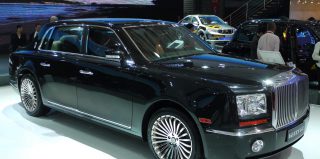Woman dies in 20-car pile-up on A40 as cold weather alert issued A acute drop in temperatures has prompted Public Health England to send outs its most serious cold weather alert of the winter so far, warning conditions are severe enough to endanger the elderly. Forecasters have also issued a severe weather warning as the […]
Cybersecurity student researches how to keep cars safe from hacking
In 2015, two researchers remotely hacked a Jeep Cherokee being driven by a reporter who documented how the researchers managed everything from the car’s radio and media console to its brakes and steering.
For Dr. Shucheng Yu, an associate professor of computer science at the University of Arkansas at Little Rock, the exercise demonstrated how vulnerable clever cars with GPS, Bluetooth, and internet connections are to cyberattacks.
“These cars have become the trend of the future,” Yu said. “There could be some very severe consequences if someone hacked into the car. A car can be fully managed by the hacker if it is not protected.”
So Yu and his student, Zachary King, a junior majoring in computer science at UALR, spent the summer researching how to keep cars safe from cyberattacks. They worked on the project during an intensive eight-week summer research program at UALR.
King was one of ten college students from across the country recruited through a National Science Foundation grant-funded project, “REU Site: CyberSAFE@UALR: Cyber Security and Forensics Research at the University of Arkansas at Little Rock.”
The purpose of the program is to decrease cyberattacks on people using mobile technology and social networking sites, said Dr. Mengjun Xie, an associate professor of computer science and director of the CyberSAFE@UALR program.
“The basic idea is to integrate cybersecurity and cyber forensics research with the latest technology in mobile cloud computing and social media to provide research opportunities to students,” Xie said.
More than one hundred thirty students applied for ten catches sight of. Participants included undergraduate college students with a grade point average of Three.0 or higher who are majoring in computer science, computer engineering, math, physics, or electrical engineering
Those selected spent eight weeks conducting research total time with a faculty mentor at the University of Arkansas at Little Rock. Participants received a $Four,000 stipend, on-campus housing, a meal plan, and travel expenses.
How to protect your wise car
In his project, “Investigating and Securing Communications in the Controller Area Network (CAN), King created a security protocol to protect wise cars from hacking. He also built an experimental environment that simulates the communication system in a brainy car, which permits the security protocol to be tested through simulations
The research concentrates on the development of a security protocol to protect the Controller Area Network (CAN), an internal communications system in vehicles.
“There are many ways that hackers can control CAN,” King said. “Once they access it, hackers can pretty lightly control your car however they want. We are proposing to add a layer of security, so if an unauthorized person accesses it, they still wouldn’t be able to control your vehicle.”
The security protocol protects the CAN in two ways. It authenticates messages sent through the network by creating an authentication code. This authentication code permits knots on the network to differentiate inbetween a valid message and an attacker’s message.
The 2nd security feature protects against replay attacks, when a hacker attempts to breach the network by repeatedly sending an old message. The protocol uses a timestamp to calculate when the network last received the message, which verifies the message’s “freshness.”
Yu and King are continuing their research this fall. In the future, Yu hopes to collaborate with industry and funding agencies to implement the security protocol in commercial vehicles and protect cars from hackers.
As for King, participating in this summer research program has left him considering a career in cybersecurity once he graduates in 2018.
“Three months ago, I wouldn’t have been able to tell you much about cybersecurity and what a security protocol would look like,” he said. “After having finished this program, I am more interested in cybersecurity than I was before, and I may end up going that route.”
Provided by: University of Arkansas at Little Rock
Explore further
Connected, self-drive cars pose serious fresh security challenges
In a world where motor vehicles can be weapons and cars increasingly depend on internal computers and internet connections, automakers are under enlargening pressure to find ways to guard against cyber-attacks.
Jeep hackers back at Black Hat with fresh and scarier method
A pair of well-known hackers has found another way to take control of a Jeep Cherokee—this time while it’s moving at high speed.
Researchers unveil remote lock flaw on 100m cars
German and British researchers have discovered a security flaw in remote locking systems fitted to around one hundred million cars worldwide, German media reported on Thursday.
Fiat Chrysler offers hackers bounty to report cyber threats
Fiat Chrysler is turning to weekend car tinkerers and good-guy hackers to expose software vulnerability in its cars and trucks.
Benefits and risks of the ‘Internet of Things’
Technology publications call two thousand fifteen “the year of the car hack.”



